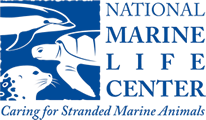Hooded Seal in Buzzards Bay
 This evening I received a call about a seal nearby that had been hauled out on a dock all afternoon. The caller was concerned the animal might be sick or injured. After referring the caller to the IFAW Marine Mammal Rescue and Research Program (hotline 508-743-9548), the authorized respondants to stranded seals and dolphins on Cape Cod, I went over to take a look.
This evening I received a call about a seal nearby that had been hauled out on a dock all afternoon. The caller was concerned the animal might be sick or injured. After referring the caller to the IFAW Marine Mammal Rescue and Research Program (hotline 508-743-9548), the authorized respondants to stranded seals and dolphins on Cape Cod, I went over to take a look.
The seal was a juvenile hooded seal (Cystophora cristata), known as a “blueback” because of the blue-ish gray fur on its back. It had a yellowish underbelly and it’s face was a darker gray.
 Hooded seal pups are born on the ice off eastern Canada in late March. They have the shortest nursing period of any seal – only four days! Pups keep their “blueback” coloring for about 14 months, then develop a spotted coat. Adult males of this species have a black inflatable sac on their nose. They also can inflate their nasal septum into a reddish “balloon”. The males exhibit this behavior to attract females and to display hostility to potentially competing males. They are fascinating animals! Click here for NOAA’s guide on hooded seals.
Hooded seal pups are born on the ice off eastern Canada in late March. They have the shortest nursing period of any seal – only four days! Pups keep their “blueback” coloring for about 14 months, then develop a spotted coat. Adult males of this species have a black inflatable sac on their nose. They also can inflate their nasal septum into a reddish “balloon”. The males exhibit this behavior to attract females and to display hostility to potentially competing males. They are fascinating animals! Click here for NOAA’s guide on hooded seals.
This blueback may have been resting after a long swim. IFAW’s staff advised we leave it overnight and check again in the morning.
 So what should you do if you see a seal on the beach?
So what should you do if you see a seal on the beach?
~ Stay at least 50 yards away. If the seal reacts to your presence, you’re too close.
~ Ask other people to stay away, and keep dogs at a safe distance.
~ Observe the animal from a distance, note it’s size, weight, markings, body condition, and whether or not there are any wounds. If you have a camera or camera phone, take a photo.
~ Note your location and any significant landmarks nearby.
~ Call the authorized stranding network organization. It is illegal – and dangerous – for untrained people to get too close to seals. On Cape Cod, call the IFAW Marine Mammal Rescue Hotline at 508-743-9548. Elsewhere, check out this map from NOAA to find the authorized respondent in your area. If you can’t find the number, call your local animal control or police department; they will have the number of folks who can help.
~ Follow the stranding network personnel’s instructions.
 Seals periodically come out of the water to rest on the beach. This is normal and, in fact, necessary for seals. Unless an animal is clearly in distress, many stranding networks prefer to leave an animal on the beach for at least an overnight in order to see if the animal will leave on its own.
Seals periodically come out of the water to rest on the beach. This is normal and, in fact, necessary for seals. Unless an animal is clearly in distress, many stranding networks prefer to leave an animal on the beach for at least an overnight in order to see if the animal will leave on its own.
The National Marine Life Center is getting closer to opening our new hospital. With the first two tanks nearly ready, we are already raising funds to expand and add more rehabilitation space. You can help by voting for us to win a $250K grant from the Pepsi Refresh Program. Click here to vote, and/or text 104765 to Pepsi (73774). If texting, standard messaging rates apply.
